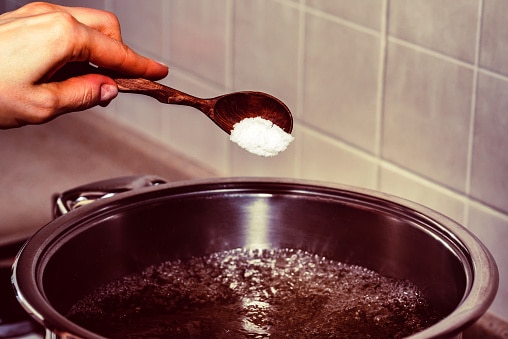Saltwater, a staple in many culinary practices, has some interesting properties. One of the frequently asked questions about it is, “How long does it take for saltwater to boil?” If you’re looking for a quick answer, it’s this: the boiling time of salt water isn’t drastically different from that of regular water. But if you’re intrigued to know more about why and how it differs, keep reading!
Salt Water vs. Fresh Water: The Boiling Point
You may have heard that adding salt to water elevates its boiling point. While this is true, the actual change is quite minimal. The amount of salt that would typically be added to a pot of water for cooking is far too small to make a significant difference in the boiling point.

Hence, if your question is, “Does salt water take longer to boil?” the answer is technically yes, but it’s unlikely that you’d notice any substantial difference.
The Effect of Salt on Boiling Water
So, why does salt in water seem to make it boil faster? This is a bit of a common misconception. What’s actually happening is that salt water can heat up faster due to the salt’s effect on the water molecules.
However, remember that while saltwater might heat up more quickly, it has to reach a higher temperature to boil, which takes longer. It’s like running a race where you get a head start but also have to travel a little further than someone who started from the beginning.
Yet, to witness a noticeable change in the boiling point or time, you’d need to add an inordinate amount of salt to your water – definitely more than what’s typically used in the kitchen.
Why Add Salt to the Water in the First Place?
Most people add salt to the water while cooking for two reasons: flavor enhancement and a slight reduction in boiling time. The added salt enhances the taste of foods cooked in the water, such as pasta or potatoes.
As for the boiling time, though the difference is minute, every second counts in a busy kitchen!
Factors Influencing the Boiling Time of Salt Water
The time it takes for saltwater to boil can be influenced by several factors. This includes the type and quantity of salt, the size and shape of the pot or pan, the initial temperature of the water, and the volume of water being boiled.
Interestingly, one way to hasten the boiling time is to add a pinch of baking soda to the water. This helps break down water molecules, making it easier for them to escape as steam. Another trick is to preheat your pot or pan before adding any liquid. This can prevent heat loss when the ingredients are added.
Does Baking Soda Heat Up Water?
In case you’re wondering, adding baking soda to water does slightly increase its temperature. This occurs due to an exothermic reaction where the chemical bonds of the baking soda and water interact, releasing energy, which in turn raises the temperature of the water. However, like with salt, this increase is quite small and generally negligible for culinary purposes.
In conclusion, while salt water does technically take longer to boil than fresh water, the difference is so small that it’s unlikely to impact your cooking or meal preparation time. Understanding these nuances can empower you as a cook and help you better navigate your kitchen tasks!

Jay
Jay is a health and wellness enthusiast with expertise in water quality and nutrition. As a knowledgeable advocate for holistic well-being, Jay successfully manages Type 2 Diabetes through informed lifestyle choices. Committed to sharing reliable and authoritative insights, Jay combines firsthand experience with a passion for enhancing health."
